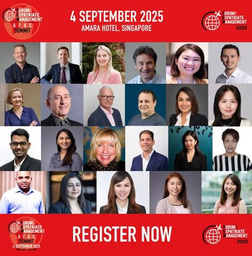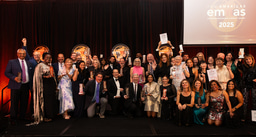Judging The EMMAs - A Personal Perspective and Nomination Tips

Judging the EMMAs – A Personal Perspective – Plus Some Tips on Improving Nominations
It is an honor to serve as an EMMA judge. I’m now in my 11th year. The thing I enjoy most is reading thought-provoking, well-written nominations that describe the work of leading global mobility organizations. I consider it a privilege to play a role in recognizing their accomplishments.
Of course, not every nomination is well-written. Some are exercises in frustration. When one arrives at the end of a few EMMA nominations, I feel frustrated. I’m sure a great story lies within the nomination. Unfortunately, it is buried under disjointed, acronym-laden text and attachments. Hopefully, some of the tips at the end of this article will help Global Mobility professionals upgrade their EMMA nominations.
My anticipation around the EMMAs starts in mid-January after the chaos of the holidays subsides and I’ve already broken one (or more) resolutions. I start checking my in-box to see if I have an invitation from FEM to serve as judge for another year. When I see it arrive, I’m delighted.
The next big milestone is when a judge gets the link to the EMMAs judging application. FEM has made many improvements over the years to streamline the process for judges. That allows judges to focus their time and attention on the nomination contents. Once I get the link, I check for the number of categories, number of nominations and the amount of time I have to provide the results. I then compare that with my professional and personal calendar. Invariably, it is obvious that I’ll have some long days and late nights. Get the coffee going!
Over the years, I think I’ve been a judge for just about every EMMA category. While there are a couple that I seem to get with higher frequency, FEM category assignments do vary from year to year. My initial task is to decide which category I’ll tackle first. Some years, I start with the category that has the most nominations. Other years, I may choose a category that is new to me.
Once I’ve decided where to start, I read quickly through all the nominations. That is where a get a realistic sense of how long it will take to judge the group. For example, a category with four nominations may appear, at first glance, to take little time. If each of the four nominations are accompanied by the maximum number of attachments and all attachments are long, it could actually take more time than eight nominations, six of which have no attachments. The length of the nominations rarely indicate quality. Short, focused nominations with a powerful narrative can be better than a long nomination that wanders all over the lot without actually honing in on a key message. Throwing in everything, including the kitchen sink, rarely results in an EMMA.
My next step is to carefully read through each nomination from start to finish. I look for blocks of time when I can start and finish a nomination without interruption. Judging does not go well with multi-tasking! I take careful notes as I’m going through so I don’t have to re-read the nomination later. After I finish reading the nomination, I assign it an initial score and write some comments in the FEM judging tool. I continue on until I’ve scored all the nominations in the category.
On a rare occasion, when I have scored all the nominations, I review the scores and conclude that they accurately reflect my judgement in that category. This was more common in the early years. Of late, there are usually enough top-drawer nominations that I have to go back and review my notes, and sometimes re-read, the top three or four nominations until I am comfortable that I’ve identified and correctly ranked the nominations. This is one of the hardest aspects of being a judge but also one that provides the most satisfaction.
The final judging milestone comes after the EMMAs dinner when the nominations are announced. I’m always curious to compare my personal ranking with the announcements from the stage. Most of the time, the announcements mirror my ranking. If they don’t, I can usually see why my fellow judges favored entry X over entry Y. With so many top competitors, the difference between number one and number four is often razor thin.
You may have noticed in my description of the judging process that it is quite solitary. Other than inviting one to be a judge and providing a link to the judging app, I rarely hear anything from FEM. Only a couple of times have they reached out to me over the years. Those happened when a judge discovered that he or she had a conflict of interest in a category and recused themselves. FEM then needed to find a different judge with the bandwidth to add yet another category. I try to help when possible.
FEM has always stressed confidentiality – of the material that we read in the nominations and around individual judging assignments. While the names and photos of all the judges are posted on the website, no one knows who is scoring what category – not even the other judges. In fact, over the years, I’ve never had anyone, including another judge, reach out to me to ask how I felt about a category or try to influence me on a nomination. I’m glad. I wouldn’t have it any other way.
So, after reading countless nominations over the years, what are some tips for writing a nomination that makes into the top tier that judges will agonize over? Here are my suggestions.
- Follow the FEM Guide – FEM wrote a guide to making an EMMA nomination (COMPREHENSIVE_GUIDE_TO_ENTERING_THE_EMMAs. Every FEM tip would be on my list of suggestions.
- Enter – One can’t win an award without submitting a nomination. I’ve heard multiple descriptions of outstanding work at FEM summits over the years that weren’t recognized at the dinner. On too many occasions, I learned the organization didn’t submit a nomination. Don’t let that happen to you!
- The story – Think back to the last classic movie you streamed. One that won awards and that people still talk about years after it first screened in the theaters. Many movies have star-studded casts, great photography, dynamite special effects, etc. What separates the great ones is often the story. A compelling tale that is well told, grips the viewer and leaves one with much to think about after a stirring end. One finds that in the best EMMA nominations too. Each has a single message or theme and builds a story around how the organization achieved the results that made a real impact. The nominator, like a top-notch script writer, drives everything toward telling the story with no distractions or detours.
- Length – A great story is neither too short nor too long. A story that leaves out compelling details or fails to build essential characters leaves the viewer unsatisfied. A story full of unnecessary scenes, detours or confusion leaves the viewer frustrated, reaching for aspirin, not popcorn. Top notch EMMA nominations tell a story clearly, quickly, with no extra padding, make a point powerfully and wrap up to a compelling finish. That takes a disciplined writer who scrubs the nomination multiple times to hone in on the key theme and cuts out the fluff.
- Perspective – One technique to gauge whether the story is coming through clearly is to ask someone completely unconnected with your organization to read the nomination and describe the key message they got. If a family member, colleague or client can read your nomination and accurately describe the key theme, a judge probably will get the same story.
- Attachments – Critical to victory or defeat. Well-organized, concise attachments that build on and reinforce the nomination’s key message can boost a nomination into the top tier. A nomination with no attachments is an opportunity lost. On the other hand, one sure way to fall out of the top tier is by weighing down a nomination with attachments that have little discernable connection with the nomination’s story, go on forever and are nearly impossible to understand. Make sure the attachments align with the nomination’s story.
- Metrics – Are a great way to add context and impact to a nomination. Remember, in competitive categories, every organization is outstanding! Metrics help communicate how outstanding you are. Of course, many organizations are concerned about using actual dollars or numbers in documents that will be shared externally. This is understandable. In such circumstances, using percentages can often get across the essential message without compromise.
- Acronyms – One easy way to annoy a judge is to pepper them with organization-specific acronyms. This is particularly prevalent in attachments that contain presentations developed for internal use that are repurposed without adequate care. While industry-wide acronyms like GM for Global Mobility have a place, I recommend being very sparing in the use of acronyms. Making the judge’s job easier is never a bad idea.
- Firewalls – If you have them, do you need them? Many judges value their confidentiality. Asking a judge to disclose their identity via a firewall puts the judge in a potentially awkward position. That is particularly true if the firewall is especially intrusive and unwilling to accept an identity like “Donald Duck” (I won’t be using that one this year) without some kind of multi-factor authentication. Individual judges will approach that differently. But do you want to gamble that you get all judges who aren’t concerned about their confidentiality?
- Voice of the Client – Testimonials from clients that align with the nomination’s story can be valuable additions that lend credibility to a nomination. Those that describe how the nominee’s results impacted the client are especially powerful.
I hope these suggestions prove useful to those writing this year’s EMMA nominations. With luck, I’ll get to enjoy a few of them. I wish everyone the best of luck. And now, may the nominations begin!





Please sign in or register for FREE
Sign in OR sign up to become a registered The Forum for Expatriate Management website user
Subscribe here